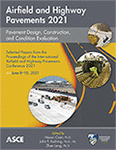A Quantitative Investigation of the Durability of Asphalt Pavement Materials Using Experimental Freeze-and-Thaw Weathering Data
Publication: Airfield and Highway Pavements 2021
ABSTRACT
This paper highlights trends in asphalt concrete damages due to freeze-and-thaw cycles. Various independent parameters, such as thermal and chemical conditions, and their combined actions contribute to these damages and reduce the service life of asphalt pavements. The existing literature is rich on the effect of freeze-and-thaw cycles in presence of deicing chemicals. Further, the assessment of damages in respect to physical, chemical, and mechanical characteristics of asphalt pavement materials has gained extensive attention in academic research and practice projects. The presented investigation examines the observed trends of damages due to various material properties and environmental conditions and aims to offer quantifiable performance measures to assess the sustainability and resilience of asphalt materials in response to severe conditions. Essential properties of asphalt materials include permeability, the porosity of aggregates, presence of chemicals or salts, water flow and pressure, chemical stability of aggregates, and applied cycles of freezing and thawing. Reported measures typically include weight loss and strength reduction. Conclusions highlight participating factors in determining the service life of asphalt pavements and associated costs and environmental footprints of transportation infrastructure.
Get full access to this article
View all available purchase options and get full access to this chapter.
REFERENCES
Amini, B., and Sharif Tehrani, S. (2012). “Simultaneous effects of salted water and water flow on asphalt concrete pavement deterioration under freeze–thaw cycles.” Int J Pavement Eng 15(5), 383–91. https://doi.org/10.1080/10298436.2012.677844.
Dukatz, E. L., and Anderson, D. A. (1980). “The effect of various fillers on the mechanical behavior of asphalt and asphalt concrete.” Association of Asphalt Paving Technologists Proceedings (49), 530-549.
Feng, D., Yi, J., Wang, D., and Chen, L. (2010). “Impact of salt and freeze–thaw cycles on performance of asphalt mixtures in coastal frozen region of China.” Cold Regions Sci Technol 62(1), 34-41. https://doi.org/10.1016/j.coldregions.2010.02.002.
Feng, D., Yi, J., Wang, L., and Wang, D. (2009). “Impact of Gradation Types on Freeze-Thaw Performance of Asphalt Mixtures in Seasonal Frozen Region.” Icctp 2009, 2009.https://doi.org/10.1061/41064(358)328.
Gong, Y., Bi, H., Liang, C., and Wang, S. (2018). “Microstructure Analysis of Modified Asphalt Mixtures under Freeze-Thaw Cycles Based on CT Scanning Technology.” Applied Sciences, 8(11), 2191. https://doi.org/10.3390/app8112191.
Guo, M., Tan, Y., Wang, L., and Hou, Y. (2018). A state-of-the-art review on interfacial behavior between asphalt binder and mineral aggregate. Frontiers of Structural and Civil Engineering, 12(2), 248-259. https://doi.org/10.1007/s11709-017-0422-x.
Guo, Q., Li, G., Gau, Y., Wang, K., Dong, Z., Liu, F., and Zhu, H. (2019). “Experimental investigation on bonding property of asphalt-aggregate interface under the actions of salt immersion and freeze-thaw cycles” Constr Build Mater, 206, 590-99. https://doi.org/10.1016/j.conbuildmat.2019.02.094.
Hassan, Y., Abd El Halim, A., Razaqpur, A., Bekheet, W., and Farha, M. (2002). “Effects of runway deicers on pavement materials and mixes: Comparison with road salt.” J Transportation Eng 128(4), 385–91. https://doi.org/10.1061/(asce)0733-947x(2002)128:4(385).
Hong, J., Wang, K., Xiong, Z., Gong, M., Deng, C., Peng, G., and Zhu, H. (2019) “Investigation into the freeze–thaw durability of semi-flexible pavement mixtures.” Road Materials and Pavement Design, DOI: https://doi.org/10.1080/14680629.2019.1599995.
Lovqvist, L. (2019). Towards frost damage prediction in asphaltic pavements. Thesis. KTH Royal Institute of Technology, Stockholm, Sweden.
Nazari, M., Tehrani, F. M., Ansari, M., Jeevanlal, B., Rahman, F., and Farshidpour, R. (2019) “Green strategies for design and construction of non-auto transportation infrastructure.”, San Jose, CA: Mineta Transportation Institute.
Nelson, D., and Tehrani, F. M. (2018) “Is resilience … sustainable?” APWA Reporter, 85(8), 53-56.
Tang, N., Sun, C. J., Huang S. X., and Wu, S. P. (2013) “Damage and corrosion of conductive asphalt concrete subjected to freeze–thaw cycles and salt.” Mater Research Innovations 17(1), 240-245. https://doi.org/10.1179/1432891713Z.000000000223.
Tehrani, F. M. (2015) “Noise abatement of rubberized hot mix asphalt.” Int J Pavement Research and Technology. 8(1), 58-61. https://doi.org/10.6135/ijprt.org.tw/2015.8(1).58.
Tehrani, F. M. (2017) “Sustainability and resilience through project management.” The 5th International Congress on Civil Engineering, Architecture & Urban Development, Tehran, Iran: Sh. Beheshti University. (December 2017), AB-01440-B.
Tehrani, F. M. (2019) “Deploying and rating sustainable practices for resilient bridge infrastructure.” Keynote Lecture, Proc. The Fifth International Conference on Bridges, Tehran, Iran: Amirkabir University of Technology. (December 17-18, 2019), MS05.
Tehrani, F. M. (2020a). “Service life prediction of structural lightweight concrete using transport properties,”, October 2020, Chicago, IL: Expanded Shale, Clay and Slate Institute.
Tehrani, F. M. (2020b) “An experimental investigation of mechanical properties of bonded concrete.” Euro J Eng Research and Sci, (5)12, 88-91. https://doi.org/10.24018/ejers.2020.5.12.2290.
Tehrani, F. M., and Dadkhah, M. (2018) “A case study on the analysis of energy and emissions for sustainability rating.” The Int J Climate Change: Impacts and Responses. 1(3), 13-23. https://doi.org/10.18848/1835-7156/CGP/v10i03/13-23.
Tehrani, F. M., Nazari, M., Truong, D., and Farshidpour, R. (2019) “Sustainability of tire-derived aggregate concrete: A case study on energy, emissions, economy, and ENVISION.” Proc. Int Conf on Sustainable Infrastructure 2019: Leading Resilient Communities through the 21st Century, Los Angeles, CA: ASCE. (November 6-9, 2019), 399-408. https://doi.org/10.1061/9780784482650.043.
Information & Authors
Information
Published In
Copyright
© 2021 American Society of Civil Engineers.
History
Published online: Jun 4, 2021
Authors
Metrics & Citations
Metrics
Citations
Download citation
If you have the appropriate software installed, you can download article citation data to the citation manager of your choice. Simply select your manager software from the list below and click Download.
